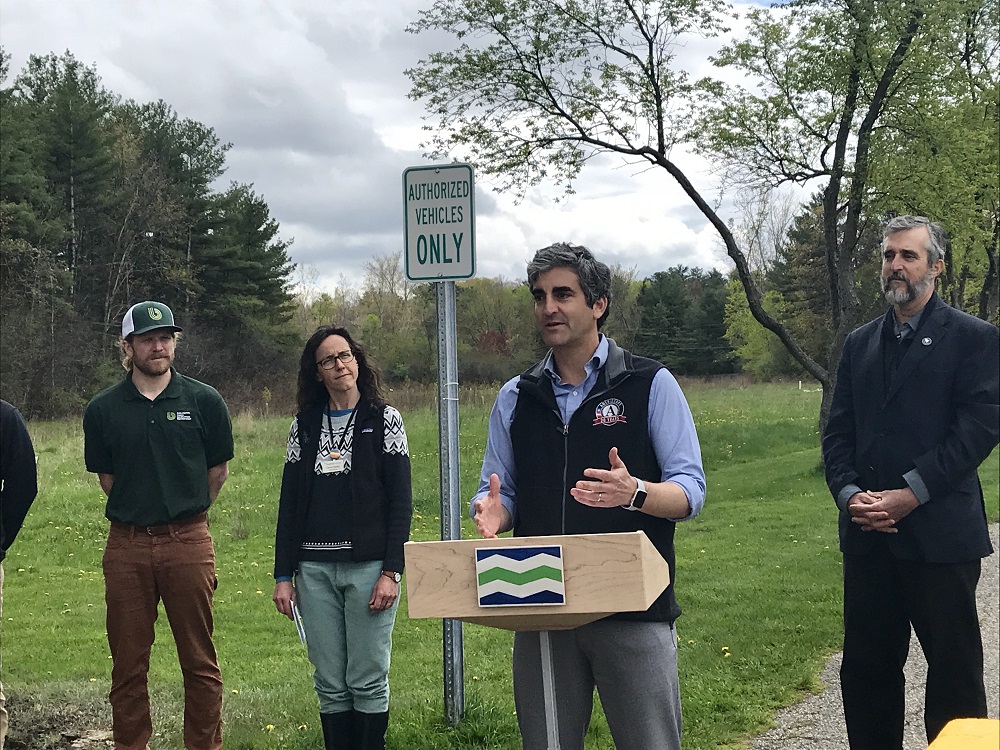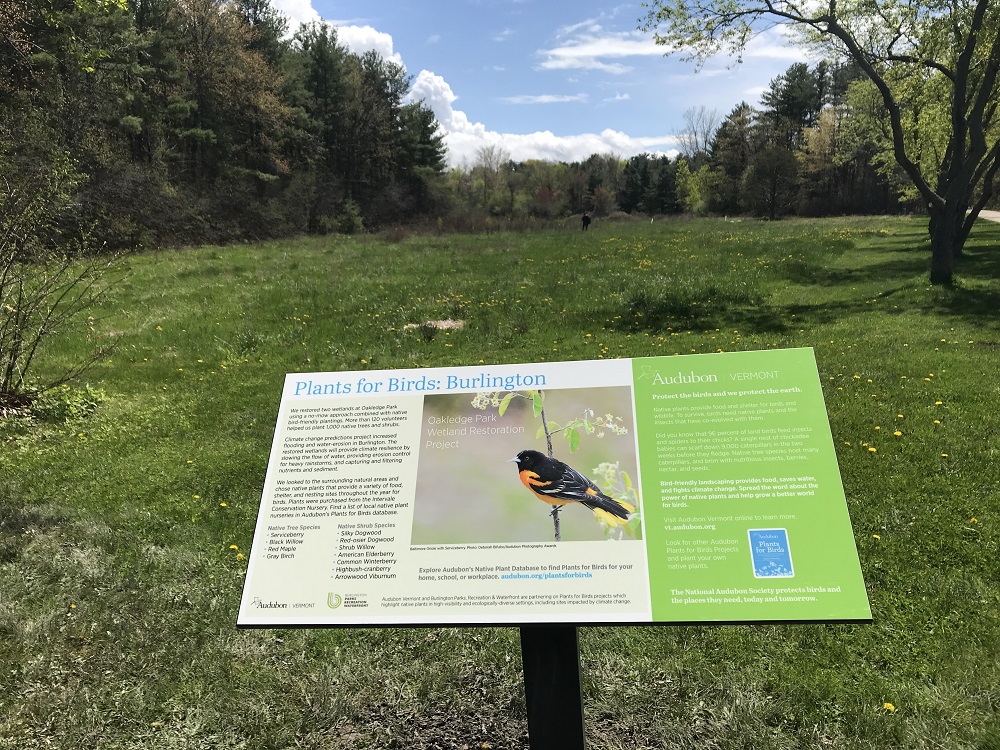FOR IMMEDIATE RELEASE
May 16, 2019
Contact: Olivia LaVecchia
(802) 734-0617
City of Burlington Planting 1,500 Restoration Trees This Season
Working with Audubon Vermont, the University of Vermont, and hundreds of community members, City marks fourth year of successful program to restore natural areas and species habitat
Burlington, VT – The City of Burlington is planting 1,500 trees and shrubs this year in order to restore natural areas of the City, and ensure that the City stewards public lands in a way that protects Lake Champlain through water filtration and erosion control, provides beneficial habitat for birds and pollinators, and enhances public spaces for all Burlingtonians. Thanks to partnerships with the University of Vermont, Audubon Vermont, and hundreds of volunteers, the City will have planted more than 4,600 trees and shrubs over the four years of this program by the end of the 2019 season.
“Part of what makes Burlington such a special place is the fact that an incredible 49 percent of our City is open space, and half of that is natural areas like wetlands and forests,” said Mayor Miro Weinberger. “These natural areas provide an essential complement to our growing and dynamic urban core, and our work to both steward them and increase access to and awareness of them is vital. I am appreciative of Dan Cahill, the City’s Land Steward, for leading this work, and to our partners in Audubon Vermont and the University of Vermont who help make it possible.”
The City is engaging in restoration plantings at three locations around the City: The 12 acres of City-managed land at 311 North Avenue along the Burlington Bike Path and the Cambrian Rise housing development in the New North End; two class two wetlands within Oakledge Park in the South End; and the 63-acre McKenzie Park along the Winooski River in the Intervale. These plantings are in addition to the 360 trees that the City is planting along streets and in parks in 2019.
As a result of these restoration plantings, today, the formerly eroding bluff at 311 North Avenue is being held in place by new root systems; formerly soggy meadows at Oakledge Park are being restored as class two wetlands to help filter stormwater runoff and provide new habitat; and silver maples are helping to rebuild the floodplain forest and stabilize the soils at McKenzie Park. Throughout, the City is also managing for invasive species, altering mowing practices, protecting and enhancing pollinator-friendly habitat, and taking other steps to ensure the vitality of these natural areas.
Since the City’s first restoration planting, in 2016, the City has planted 3,112 trees and shrubs across these three sites, and is currently planting an additional 1,523 trees and shrubs in 2019, to bring the total to date up to 4,635. This has been made possible with the help of 1,845 hours of volunteer time across 2016, 2017, and 2018. For information by location, see the table below.
By engaging hundreds of volunteers in these plantings, this program creates a new connection between the City and the broader community, helps to raise awareness of the importance of these natural areas, and accomplishes much more than the City would be able to do on its own.
The three areas where the City is conducting these plantings are characterized as natural areas in the City’s Open Space Protection Plan, which was last updated in 2014. Two years later, the City’s Land Steward, Dan Cahill, started working with University of Vermont professor Bill Keeton on a plan for plantings at 311 North Avenue. That year marked the City’s first ecological restoration project, and the City has continued to partner with Dr. Keeton’s classes. To date, students in Dr. Keeton’s classes have participated in planting about one-third of the City’s restoration trees and shrubs.
|
Trees Planted |
Volunteer Hours |
||||||||
|
|
2016 |
2017 |
2018 |
2019 |
2016 |
2017 |
2018 |
||
|
311 North Ave |
550 |
120 |
454 |
93 |
300 |
55 |
375 |
||
|
Oakledge |
|
230 |
1008 |
455 |
|
120 |
450 |
||
|
McKenzie |
350 |
400 |
975 |
275 |
270 |
||||
|
Total |
550 |
700 |
1862 |
1523 |
300 |
450 |
1095 |
||
Audubon Vermont has been a second key partner in this initiative, bringing additional capacity, expertise in species-beneficial habitat, and a focus on community engagement. With Audubon Vermont’s partnership, the City’s restoration plantings include plants that are beneficial for birds in every season, like the shrub willows that blossom first thing in the spring. Audubon Vermont has also worked to help engage diverse community members in these plantings, including through a “Planting Pride” event at Oakledge Park in partnership with LGBTQ community groups, restoration planting events and a “Plants for Birds” project with the King Street Center’s after school program, a “Plants for Birds” project with students at the Sustainability Academy, and more.
The plants that the City sources for this program are native species that are locally grown at the Intervale Conservation Nursery, a program of the non-profit Intervale Center.
“It’s incredible to see a community effort like this come together, especially when the objectives offer so many benefits to Burlington,” said Dan Cahill, the City’s Land Steward. “Restoring our vital natural areas creates a ripple effect that will enhance our community for hundreds of years.”
“Audubon Vermont is excited about this terrific partnership with the City of Burlington to restore natural areas with native plants,” said David Mears, Executive Director. “Our shared work is empowering community members across a spectrum of backgrounds and interests in Burlington and beyond to unite in support of protecting birds and the places they need to thrive.”
“The partnership between my class at UVM and the City has provided real world, hands-on learning opportunities that have been invaluable for our students,” said Bill Keeton, Professor of Forest Ecology and Forestry at the University of Vermont. “Working with the City, we’ve planted more than 2,100 trees just in the past four years, removed invasive species, reintroduced American Chestnut to City parks, and helped stabilize river banks. Dan Cahill and all the staff at the City Parks Department have been absolutely instrumental in making all of this happen.”
Upcoming opportunities for the community to engage in restoration plantings include:
- Sunday, May 19: Tree Planting Day at Oakledge Park
Please see two photos below:
- Press conference on May 16, 2019
- Signage installed at a restoration planting site at Oakledge Park


# # #